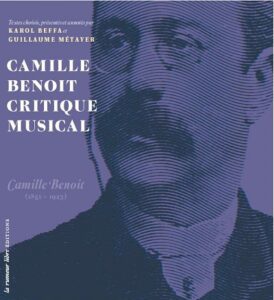Editions La Rumeur Libre has published a three-volume set dedicated to Camille Benoit, presenting him as a polymath, composer and music critic.
Camille Benoit (1851-1923) was a musicologist, composer, critic, art historian and member of the Commission de restauration des peintures des musées nationaux in France. Between 1882 and 1891, he published translations and analyses of Wagner’s works, notably Motifs typiques des Maîtres-Chanteurs de Nuremberg (1888) and a translation of Faust (1891).
In 1888, he joined the Musée du Louvre as curator of paintings and drawings, and in 1894 he was appointed assistant curator in the painting department. His activity as an art historian was considerable. He gradually built up a fine collection of drawings and paintings, organized an exhibition of French Primitives in 1904 and wrote the « Catalogue des tableaux de l’école flamande ».
At the same time, he continued to write about music and art and to compose music.
Composer and music critic, he was one of César Franck’s main pupils. After attending the first Bayreuth Festival, his fascination with Wagner led him to study his works intensively.
Benoit was also a great discoverer of artists, one of the first introducers of Tchaikovsky in France.
He was also a poet and, above all, a respected composer. His music was performed with great success, before sinking into oblivion.
 The three volumes in this boxed set offer all the keys needed to approach this unique personality: a general essay followed by texts and documents, by Guillaume Métayer, CNRS researcher and translator; a musical analysis of his scores (reproduced in Appendix) by Karol Beffa, composer and musicologist; an anthology of Camille Benoit’s music criticism texts, presented by the two researchers.
The three volumes in this boxed set offer all the keys needed to approach this unique personality: a general essay followed by texts and documents, by Guillaume Métayer, CNRS researcher and translator; a musical analysis of his scores (reproduced in Appendix) by Karol Beffa, composer and musicologist; an anthology of Camille Benoit’s music criticism texts, presented by the two researchers.
Of these three volumes, it is above all the one with Benoit’s texts that is most interesting. One can only marvel at the profundity of his analyses, be it on Wagner, Bach or Dvorak or the importance of folk music. His judgments are often subjective, often with a relentless sharpness (« They seem more concerned with writing a lot than writing well »), but above all these texts are timeless and still enriching today because of their illuminating perspicacity.
Editions La Rumeur libre
Volume 1 – Camille Benoit critique musical. Textes choisis, présentés et annotés par Karol Beffa et Guillaume Métayer
Volume 2 – À la recherche d’un polymathe oublié, Camille Benoit (1851-1923) par Guillaume Métayer
Volume 3 – Camille Benoit compositeur, par Karol Beffa
ISBN 978-2-35577-323-5






















